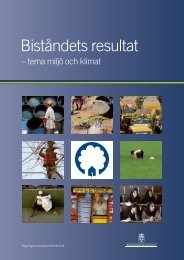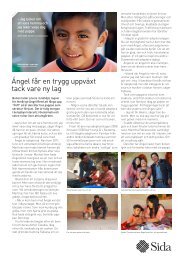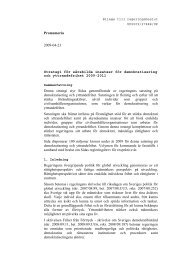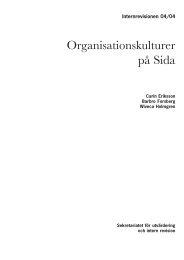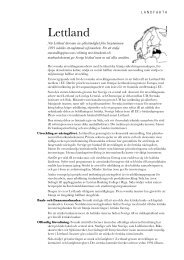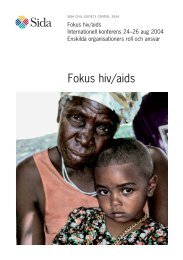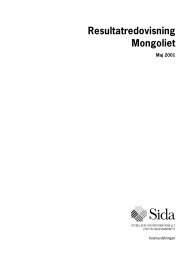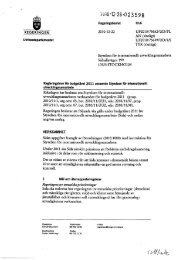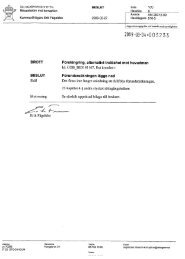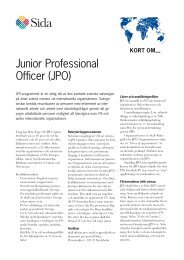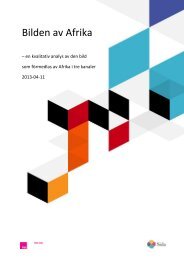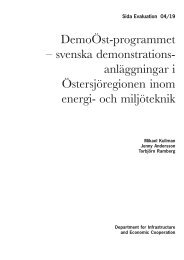Mid-Term Review of the AGIR Programme - Sida
Mid-Term Review of the AGIR Programme - Sida
Mid-Term Review of the AGIR Programme - Sida
You also want an ePaper? Increase the reach of your titles
YUMPU automatically turns print PDFs into web optimized ePapers that Google loves.
A N N E X 3 – I N C E P T I O N R E P O R T<br />
The Swedish Cooperative Centre - SCC<br />
The Swedish Cooperative Centre is a development organisation founded by <strong>the</strong> Swedish<br />
Cooperative movement in 1958 and now working in 20 countries. SCC’s primary<br />
target group is poor women and men living in rural areas and who are members or<br />
potential members <strong>of</strong> democratic organisations (co-operative organisations or farmers<br />
associations) or informal groups working for common goals. SCC supports social<br />
mobilisation and <strong>the</strong> development <strong>of</strong> member-based organisations with <strong>the</strong> aim <strong>of</strong><br />
indirectly, and with a long-term perspective, reaching <strong>the</strong> most vulnerable among <strong>the</strong><br />
poor. Before joining <strong>the</strong> <strong>AGIR</strong> programme in 2011, SCC worked, for <strong>the</strong> past decade,<br />
to streng<strong>the</strong>n <strong>the</strong> institutional capacity <strong>of</strong> local branches <strong>of</strong> farmer union enhancing<br />
democratic participation and decision making in Manica province. In Niassa province,<br />
SCC has been supporting <strong>the</strong> Civil Society Support Program (PASC) through<br />
capacity development that facilitates community-based groups, and civil society participation<br />
in political processes and <strong>the</strong> influencing <strong>of</strong> national and provincial strategies<br />
in decision-making processes among district consultative councils.<br />
CSO Partnerships<br />
The ‘core’ work <strong>of</strong> <strong>the</strong> INGO intermediaries in each <strong>of</strong> <strong>the</strong>se <strong>AGIR</strong> sub-programmes<br />
is <strong>the</strong> establishment <strong>of</strong> key partnerships with a number <strong>of</strong> local CSO partners being<br />
active in <strong>the</strong> specific <strong>the</strong>me covered by <strong>the</strong> INGO. Each <strong>of</strong> <strong>the</strong>se partnerships is established<br />
through an agreement between <strong>the</strong> INGO and <strong>the</strong> partner. The central focus <strong>of</strong><br />
<strong>the</strong>se partnerships is ‘core-funding’ with a “strong focus on capacity development. 49<br />
According to <strong>the</strong> approved strategic planning programme document, <strong>the</strong> quantitative<br />
target for <strong>the</strong> number <strong>of</strong> partnerships to be established by <strong>the</strong> end <strong>of</strong> <strong>the</strong> programme in<br />
2014 is 39 CSOs. However this target has already been bypassed, as <strong>the</strong> number <strong>of</strong><br />
active partnerships established has now reached 47. 50 Additionally, o<strong>the</strong>r interested<br />
prospective partners are currently in <strong>the</strong> process <strong>of</strong> being enrolled in <strong>the</strong> programme,<br />
qualifying (or not) through recently-undertaken partner evaluation processes.<br />
One reason for this expansion <strong>of</strong> partners is <strong>the</strong> addition <strong>of</strong> one more intermediary<br />
organisation to <strong>the</strong> programme, <strong>the</strong> Swedish Cooperative Center – SCC, who started<br />
up in 2011, one year later than <strong>the</strong> three original intermediaries. Ano<strong>the</strong>r reason is<br />
that <strong>the</strong> intermediaries, through early partnership assessments, soon found that very<br />
few CSOs qualified for long-term core partnerships as <strong>the</strong>ir capacity, particularly<br />
<strong>the</strong>ir institutional capacity, was lower than expected. More CSOs were <strong>the</strong>n supported<br />
49 Streng<strong>the</strong>ning Civil Society – Enhancing Democratic Governance, p.7, 2010. <strong>Sida</strong>.<br />
50 This number does not include some partner organisations whose contracts have been suspended,<br />
due to non-adherence to internal governance criteria, <strong>the</strong>se measures relate to i.e. MONASO, MEPT,<br />
and MISA.<br />
92




